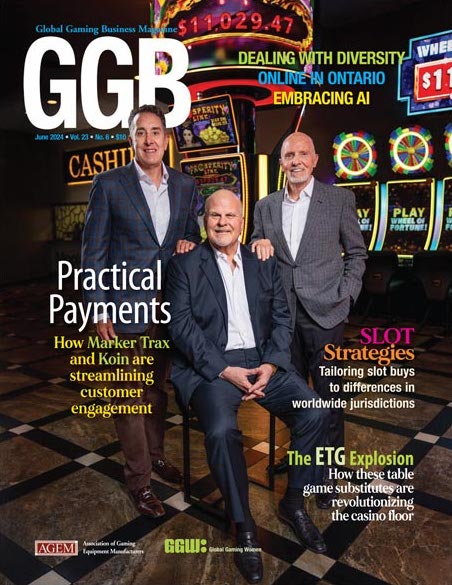Funding the Future

Over the years, it has been seen in business that great ideas often come with great costs. Synthesizing one’s vision into a tangible reality takes a financial, emotional and mental toll that may at some points feel impossible to overcome, especially when said idea breaks the conventional mold of the particular industry at hand.
For Gary Ellis, the idea of revolutionizing casino credit and payment systems by making them digital and cashless through his companies Marker Trax and Koin has been a decades-long journey that first began more than 20 years ago.
Throughout that time, the path has been circuitous, and has had many different costs, perhaps most tangibly in the form of countless checks to intellectual property attorneys during the throes of the Great Recession, years before both businesses would even be fully fleshed out.
Determination, Foresight and Connections
Ellis started in the hospitality industry at an early age as a dishwasher at his family’s Village Pub Restaurant in Las Vegas. He eventually purchased the business in his mid-20s and ultimately the neighboring hotel to form what is now the Ellis Island Hotel, Casino & Brewery on Koval Lane. He and his family have also since expanded the Village Pub brand into a series of gaming taverns throughout the city.
Since the beginning of his ventures into gaming, his “primary focus has always been on how we can improve the experience, both for our guests and for ourselves.” The biggest examples he found, and the one that would eventually lead him into an entirely new focus, were the credit and payment systems.
The reliance on credit has for decades been a necessary evil for the casino industry, as it facilitates play for the most loyal and profitable players while also inviting a fair amount of risk. At its core, it’s an imperfect science—casinos are not banks or other financial institutions, and the underwriting process is critical.
Casinos across the country have fought legal battles for decades in their attempts to retrieve unpaid markers, sometimes for hundreds of thousands if not millions of dollars. These battles are, for various reasons, usually unsuccessful and they can reflect poorly on operators both to the public and to regulators.
These costly misjudgements are what made Ellis believe that the process could be reimagined to give players the same access to funds while also preventing the money from walking out the door. Thus, the idea that would eventually become Marker Trax was born.
“Marker Trax was created because after years of walking the casino floor, I noticed how inefficient the marker process was, both for the players and for the casino itself,” he says. “And something just clicked: there had to be a better way to issue credit, and we were in the perfect position to develop it.”
Of course, no good idea has legs without the proper help, and the first person Ellis called to help build out his vision was industry veteran Charlie Skinner. When the idea was first broached, Skinner was an executive for route operator United Coin, which did a lot of business with Ellis’ Village Pubs.
Skinner says that an early version of the technology went before the Nevada Gaming Control Board in the mid-2000s, “but they wanted us to upgrade our system, which was a big lift at the time. So we told Gary, ‘We apologize, but we’re going to need to shelve this.’”
As the recession came and went, Ellis never gave up on the premise and continued to invest in its future despite not knowing if it would ever pay off. A full 10 years later, Skinner was working as the vice president of operations for Station Casinos when suddenly he got a call.
“(Ellis) calls me and I’m at my office at Stations, and he says, ‘I got the patent approved.’ And so I left shortly thereafter, and we got together and figured out how we should start to build this.”
Marker Trax was officially formed in 2018 and quickly began the arduous process of developing the technology needed to issue cashless credit, which was an especially difficult task at that time given that traditional cashless payment systems and digital wallets were also still in the early stages.
As it turns out, Ellis had long been contemplating the totality of cashless play, and had another idea to help supplement Marker Trax’s development. So he made another call, this time to Australian financial veteran Gary Larkin, a close friend with a bevy of global financial and credit experience. Larkin then joined the Marker Trax team before splitting off to head up its sister company, Koin, in 2021.
“Having met Gary Larkin through another business venture, I knew he was intimately knowledgeable about digital wallets,” Ellis says. “We joined together and created Koin. We’re aware that customers are now accustomed to the digital wallet experience, making nearly every part of their lives easier, and we wanted to incorporate this state-of-the-art technology into an enhanced experience for our gaming customers.
“Gaming operators know that the more convenience you provide your customers, the more loyalty you develop. So we began to develop Koin to bring that wallet experience to the gaming environment, to improve both the customer and operator experience.”
In the same vein as credit, casinos have also been one of the last sectors to adopt digital wallets and cashless payments, given the previous reliance on cash. As Ellis alluded to, though, casino customers have now become accustomed to such technology in other aspects of their everyday lives, meaning that the opportunity is there for those who have the expertise to bring the right platform to the industry.
But this development was also not exactly linear, as Larkin debated whether or not to jump back into a world he had already spent so much time in, for so many industries and markets around the world.
“I’ll be perfectly honest, my first reaction was, ‘No, I don’t want to do that,’” he reflects. “I’ve been doing that for years. I’m kind of over it. It’s a tough field, a lot of cost to customer acquisition. And then I went home, and I thought, ‘What an idiot I am.’” He explains that he had never been presented with such a payment-starved industry like gaming, “where the operators would actually pay you to come and get the customer relationship. I said, ‘I think we better go take a look at this.’”
By April 2023, both Skinner and Larkin were appointed president of their respective companies, signaling a new chapter for the venture that at times seemed so far away.
A Little Help from Our Friends
Since their initial inception, both companies have worked to build out their products while also landing top-tier talent and securing vital partnerships. Perhaps the most valuable partner for the two teams has been Euronet, the global payment provider and fintech giant that first invested in March 2022 and then again in December 2023.
Skinner notes that because Marker Trax’s cashless credit technology is so unique, the Euronet relationship has been especially helpful in getting access to a new set of data tools.
“As we started bringing on more players into the system, there were key things that we wanted to understand,” he says. “It was taking such a long time to have our analysts go through the numbers and run Excel models. So we went to our partners at Euronet a couple years ago and said, ‘We’re getting this data in, but we need a way to get it out in a seamless, frictionless manner.’
“So over the last 15 months, they rebuilt our data warehouse, our business intelligence tools. Now, our analytics are probably one of the strongest parts of our business. And in terms of underwriting and issuing credit, the data and the analytics are everything. How we underwrote three years ago is way different than how we underwrite today, and that continues to evolve and get better as more data comes into the system.”
From Larkin’s perspective, the investment has been instrumental in helping to bolster Koin’s security and privacy capabilities while also giving the brand an international credibility that is hard to come by organically. These two factors have gone a long way to build trust with operators, which is an ultimate goal for any payment provider.
“Bringing (Euronet) into the frame, allowing them to help us improve security over every aspect of our solution top to bottom, was a big part of getting large operators comfortable with sharing data with us,” he notes.
“Knowing that we are living to GDPR standards for Europe, well above anything we’re required to do (in the U.S.), it’s allowed us to have conversations with foreign regulators because they’re very comfortable that we’re well-founded. Not just because we have good tech supporting us, but because we have true security data—data security as a corporate culture. It can’t be just a process. We think it’s a never-ending journey.”
In addition to third parties, both Marker Trax and Koin have also benefited tremendously from the unique perk of having Ellis Island as essentially an in-house property where they can test and refine their products and overall strategies, which is a huge advantage in a sector where operators are hesitant to turn over the keys.
“Having Ellis Island as a platform to launch and refine our technologies has been invaluable,” Ellis contends. “Rather than just tests, though, these deployments demonstrate our confidence in our products’ value and reliability. We’ve built a tremendous amount of loyalty and trust with our customers over the years, and we have debuted Marker Trax and Koin innovations at Ellis Island with the confidence that we’re improving our customers’ experience.”
This arrangement not only saves money, but it also allows for a degree of experimentation that other providers simply don’t have in the development stages. In this way the property could be seen as a tangible edge in a competitive field, akin to a private basketball court for a star forward or an in-house recording studio for a budding virtuoso.
In Koin’s case, the pseudo-laboratory is just another competitive advantage in a sector that has become increasingly tight as far as adoption and implementation.
“It’s a big advantage—I don’t know of any of our competitors that have that to the degree we do,” Larkin says. “It lets us do things that others can’t in real time, to learn quickly and pivot. It’s also helped inform the company a little bit on how we operate with not just Ellis Island properties and Village Pubs and others, but with all of our casino partners that are truly partners and not just clients.”
The additional nuances of cashless credit make it so that Marker Trax’s development in particular might not have even been possible in the same way without the help of a partner casino like Ellis Island to help work through the aches and pains of changing an analog process that has operated in the same way for so long.
“It’s such a unique product because there’s underwriting, you’ve got KYC, you have to kind of put it out in the wild to see what works,” Skinner says. “Nobody, even the large-scale CMS operators, have the ability to do wide-scale testing on all sorts of different games and locations that have spotty Wi-Fi and all these different nuances to deliver cashless. So we are really fortunate that we have that property, and we continue to make Ellis Island the first property when we come up with a new feature set to test it out, and make sure it’s working right. We’ve been very fortunate to have that.”
Onward and Upward
In the next 12 to 18 months moving forward, both companies will look to expand their presence and build off of their respective foundations while also working together to get the most out of each other’s resources.
Larkin explains that Koin has “some very unique offerings that we’re in the process of bringing up and rolling out now for large destination Vegas Strip properties, as well as some very interesting products for tribal and specifically the route industry.” More than that, the company’s litany of financial experience will also continue to bear fruit.
“I think the big differentiator for Koin over companies competing for attention in the cashless environment today is the fact that we’re steeped in payments domain expertise,” he asserts. “Our leadership is unquestionably sound, proven, experienced and capable of bringing change.”
For Skinner and Marker Trax, the big driver moving forward is the launch of its B2C brand Moolah Play, which was announced late last year and will continue to be a focal point moving forward. Previously, Marker Trax allowed partners to brand the product to their property, but as the company continues to evolve and grow, Skinner feels that an established B2C brand in Moolah Play is the logical next step. Existing partners may also now rebrand their products to Moolah Play.
“I’m very excited to start migrating and moving all of our properties to Moolah Play,” he says. “Currently where we have Moolah Play available, it’s been great. The credit line usage is up 300 percent, the payback improvement by 350 percent. The abandonment rates within the application process have improved. Lots of positive feedback from our players.”
In the short- to intermediate-term, Skinner says he’d “like to be live with all of the CMS operators and their versions” for Moolah Play. Now that a lot of the initial tech and regulatory hurdles have been cleared, the team is ready to hit the ground running.
“The other thing in 12 to 18 months that we would like to see is to have the product have enough data coming in that we really have this thing on hyperdrive where we can put the gas on and scale this thing, and get locations live very quickly,” he says.
A lot has changed in the years since Ellis and his team first began the journey to digitize the casino payment and credit ecosystem, including the industry overall as well as Ellis Island itself, which in early April announced a new development plan that will add more than 6,400 square feet to the property by expanding the gaming floor and carving out additional back-of-house space. The project is expected to debut in early 2025.
But despite these changes, the mission has remained the same: to make things better, simpler, more efficient and more enjoyable—in other words, to continue to give the people what they want.
“Our aim has always been to lead the cashless revolution, but that’s driven by customer demand rather than mere technological advancement,” Ellis says. “As we move forward, we’ll continue to refine our technologies to align with consumer preferences and operational efficiencies. Our goal is not just innovation for innovation’s sake, but to truly improve the customer experience.”

